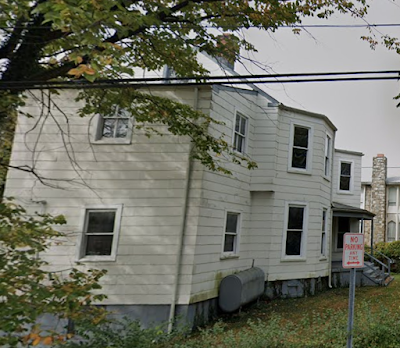Montgomery County Halloween CountdownToday, as we count down the final days to Halloween, let's take a look at the Halloween 1976 edition of The Rockville Mall Times. Yes, Rockville's ill-fated dead mall of the 1970s and 80s had its own newspaper, and it could be as creepy as many considered the mall to be. Especially the Halloween edition. Who was Mr. Barfly, and was he a denizen of the shadows of the mall? Are you encouraged, or discouraged, to visit Ransom's, with Mr. Barfly as the face of the business? His disturbing visage suggests a ransom may indeed be involved to secure your release from his clutches, and from the mall's infamous dark parking garage.
 |
Mr. Barfly, a denizen of the darkest
corners of the Rockville Mall |
"Hey, kids! Let's all pile into the station wagon and pick up a copy of
Adolf Hitler by John Toland at Waldenbooks at the Rockville Mall." With
Roots as the other choice highlighted, talk about a stark contrast in offerings. Some lighthearted reading for the whole family at Waldenbooks.
Name-brand leisure suits were 50% off - if Herb Tarlek didn't get to Crane's Men's Shop first and clean 'em out. It's hard to get more 70s than leisure suits. But Beyda's gave it the old college try with corduroy, gabardine and velveteen pantsuits.
The front-page story in the Halloween 1976 edition of the The Rockville Mall Times looked back at the tragic demolition of the Rockville's historic town center with an almost-giddy glee. Vinson's drugstore and the Milo theater are visible in a bustling scene from 1945. Thirty years later, the Rockville Mall fills the field of view from the same photographic vantage point (and only 20 years later, the mall itself would be demolished).
"Progress comes to Rockville," the headline reads. "Shopping sure has changed in Rockville," the article begins. The uncredited reporter made sure to thank the city politicians who approved the demolition of most of the original, historic buildings in downtown Rockville. "During this week, Rockville Mall also salutes the City of Rockville for the many years of progressive city planning that has made Rockville a model city for responsive government, and a convenient place for residents to shop."

A 1976 mall directory shown lists more than 30 tenants. But in a sign of the mall's struggles, previous department store anchors Lansburgh and Lit Brothers were already conspicuously missing from the roster. The interesting names among the remaining tenants were Roy Rogers, Franklin Simon department store and W&J Sloane furniture (both from the same ownership group as Lansburgh and Lit Brothers, coincidentally), King's Court (an original tenant when the mall opened, the restaurant closed in 1984 when its space was replaced with an elevator shaft in the "Rockville Metro Center" makeover of the mall), Friendly's Ice Cream and Real Rich Ice Cream (2 ice cream shops! Which one was better?), Masi's Fun House (was Mr. Barfly ever lurking in there, as well?), Kurly's (what's that?), Empress Restaurant and Waxie Maxie's record store.

In case shoppers didn't already have it penciled in on their calendars, The Rockville Mall Times noted that National Alcoholism Week was rapidly approaching on November 12. But just when the gloom became too much, the Times promised that "Santa arrives at Rockville Mall Friday, November 26 at 10 AM." After a reminder to "Support your local Rockville Mall merchant who supports you with low prices," the front page ends with the mall's 70s logo, and the tagline "GOOD NEWS/GOOD TIMES."























































